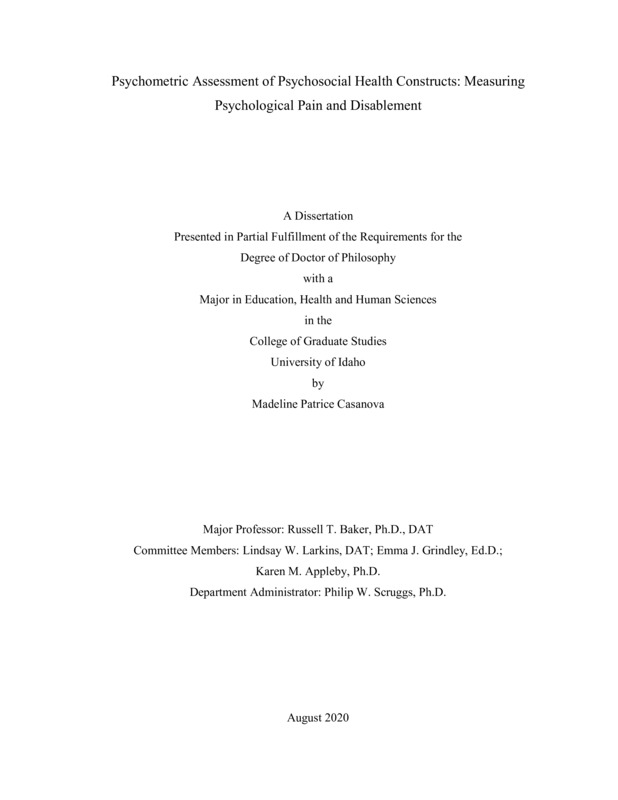Psychometric Assessment of Psychosocial Health Constructs: Measuring Psychological Pain and Disablement
Casanova, Madeline Patrice. (2020-08). Psychometric Assessment of Psychosocial Health Constructs: Measuring Psychological Pain and Disablement. Theses and Dissertations Collection, University of Idaho Library Digital Collections. https://www.lib.uidaho.edu/digital/etd/items/casanova_idaho_0089e_11921.html
- Title:
- Psychometric Assessment of Psychosocial Health Constructs: Measuring Psychological Pain and Disablement
- Author:
- Casanova, Madeline Patrice
- ORCID:
- 0000-0001-8383-3232
- Date:
- 2020-08
- Embargo Remove Date:
- 2021-09-03
- Program:
- Movement & Leisure Sciences
- Subject Category:
- Health sciences; Educational tests & measurements; Statistics
- Abstract:
-
Health care professionals are tasked with incorporating evidence-based practice (EBP) and assessing practice effectiveness, which can be accomplished by using health-related patient reported outcome (PRO) instruments. Clinicians use PRO instruments to assess a wide variety of health-related constructs (e.g., quality of life, pain, disablement) and must decide which instrument is relevant and important to use for patients. Many PRO instruments, however, have not been tested using the recommended contemporary psychometric analysis techniques. Therefore, the purpose of this dissertation was to assess the psychometrics of two psychosocial health instruments used in clinical practice and research: 1) Orbach and Mikulincer Mental Pain (OMMP) scale and 2) Disablement in Physically Active Short Form-8 (DPA-SF) scale.
The OMMP is an instrument designed to assess psychological pain; however, previous research has not yielded a consistent scale structure, and the internal consistency of the subscales have not met recommended values. Therefore, confirmatory factor analysis (CFA) was conducted on the 9-factor, 44-item OMMP. Model fit indices were not met and an exploratory factor analysis (EFA) was conducted to identify a more parsimonious (i.e., OMMP-9) structure. The OMMP-9 was then tested in a covariance model and refined further to create the OMMP-8. The OMMP-8 was then subjected to invariance testing between age groups, sex, activity classification, activity level, and injury status. The 9-factor, 44-item OMMP did not meet recommended measurement criteria and should not be recommended for use in research and clinical practice in its current form. The refined OMMP-8 met recommended measurement invariance criteria and may be a more viable option to use; however, more research should be completed prior to adoption.
The DPA SF-8 has been proposed as a tool to be used in the physically active population to assess a physical summary component (PHY) and a quality of life component (QOL) of disablement; however, analysis of scale structure has not been confirmed with a sample of individuals who have only answered the eight items included in the scale. Additionally, further scale development analyses (e.g., reliability, responsiveness, longitudinal invariance) to ensure psychometrics are sound have not been completed. Therefore, confirmatory factor analyses (CFAs) were conducted on the 2-factor, 8-item scale on each time point (i.e., visit) to ensure factor structure. Additionally, the reliability of the scale and internal consistency of the subscales were assessed; a minimal detectable change (MDC) value was calculated; minimal clinically important differences (MCID) were established; and, invariance testing across three visits and groups was conducted. The CFAs at all three visits exceeded recommended model fit indices, the intraclass correlation coefficient value (.924) calculated indicated excellent scale reliability, and Cronbach’s alpha for subscales PHY and QOL were within recommend values. The MDC value calculated for summative scale scoring was 5.83 points, while the MCID values for persistent injuries was 2 points and 3 points for acute injuries. The DPA SF-8 was invariant across time and across subgroups. The DPA SF-8 met CFA recommendations and criteria for multi-group and longitudinal invariance testing, which indicates the scale may be used to assess for differences between the groups or across time. Our overall analysis indicates the DPA SF-8 is a valid, reliable, and responsive instrument to assess patient improvement in the physically active population.
- Description:
- doctoral, Ph.D., Movement & Leisure Sciences -- University of Idaho - College of Graduate Studies, 2020-08
- Major Professor:
- Baker, Russell T
- Committee:
- Larkins, Lindsay W; Grindley, Emma J; Appleby, Karen M
- Defense Date:
- 2020-08
- Identifier:
- Casanova_idaho_0089E_11921
- Type:
- Text
- Format Original:
- Format:
- application/pdf
- Rights:
- In Copyright - Educational Use Permitted. For more information, please contact University of Idaho Library Special Collections and Archives Department at libspec@uidaho.edu.
- Standardized Rights:
- http://rightsstatements.org/vocab/InC-EDU/1.0/

